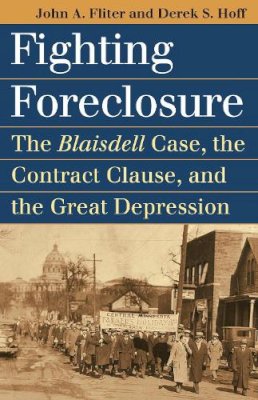
Stock image for illustration purposes only - book cover, edition or condition may vary.
Fighting Foreclosure: The Blaisdell Case, the Contract Clause, and the Great Depression (Landmark Law Cases and American Society) (Landmark Law Cases & American Society)
Derek S. Hoff John A. Fliter
€ 41.66
FREE Delivery in Ireland
Description for Fighting Foreclosure: The Blaisdell Case, the Contract Clause, and the Great Depression (Landmark Law Cases and American Society) (Landmark Law Cases & American Society)
Paperback. The first book-length study of the landmark 1934 Supreme Court decision that validated efforts by states to offer legislative relief to Depression-era citizens struggling to keep their farms and homes. The close 5-4 decision remains a touchstone for debates over the constitutionality (and benefits) of state intervention to the economy. Num Pages: 224 pages. BIC Classification: 1KBB; HBJK; HBLW; LND. Category: (G) General (US: Trade). Dimension: 216 x 140 x 18. Weight in Grams: 295.
In the depths of the Great Depression, when foreclosure rates skyrocketed across the United States, more than two dozen states passed mortgage-extension or -adjustment laws to help farmers and homeowners keep their properties. One such statute in Minnesota led to the most important property law case of its time and still casts a long shadow upon constitutional debates and our own era’s severe economic downturn.
Fighting Foreclosure marks the first book-length study of the landmark 1934 Supreme Court decision in Home Building and Loan Association v. Blaisdell, which, by a 5–4 vote, upheld the Minnesota Mortgage Moratorium Act. Blaisdell validated efforts by states to offer legislative relief to citizens struggling to keep their farms and homes. But it caused an outcry among banking interests and conservative legal theorists, who argued that these laws violated the Contract Clause of the Constitution and interfered with our free market system.
In his majority opinion, Chief Justice Charles Evans Hughes argued that the reasonable and limited nature of the law and the unusual severity of the emergency it addressed placed it firmly within the “police powers” of the states to protect the health and safety of the people. In a strongly worded dissent, Justice George Sutherland argued for a consistent and strict interpretation of the Contract Clause regardless of economic exigency.
John Fliter and Derek Hoff provide a concise history and analysis of not only this landmark case and the reasoning behind its sharply divided decision but also of the entire history of the Contract Clause. They trace closely the agricultural crisis, political pressures, and farmer-protest movement that produced the Minnesota law. And their study contributes to scholarly debate about the origins of the Constitutional Revolution of 1937, by which the Supreme Court accepted the New Deal, as well as to public debates about constitutional interpretation and the role that government should play in providing relief to distressed citizens.
In the midst of our nation’s ongoing suffering from massive foreclosures and bankruptcies, Fighting Foreclosure also offers a potent reminder that the High Court’s decisions often revolve around lives at risk as much as abstract legal debates.
Fighting Foreclosure marks the first book-length study of the landmark 1934 Supreme Court decision in Home Building and Loan Association v. Blaisdell, which, by a 5–4 vote, upheld the Minnesota Mortgage Moratorium Act. Blaisdell validated efforts by states to offer legislative relief to citizens struggling to keep their farms and homes. But it caused an outcry among banking interests and conservative legal theorists, who argued that these laws violated the Contract Clause of the Constitution and interfered with our free market system.
In his majority opinion, Chief Justice Charles Evans Hughes argued that the reasonable and limited nature of the law and the unusual severity of the emergency it addressed placed it firmly within the “police powers” of the states to protect the health and safety of the people. In a strongly worded dissent, Justice George Sutherland argued for a consistent and strict interpretation of the Contract Clause regardless of economic exigency.
John Fliter and Derek Hoff provide a concise history and analysis of not only this landmark case and the reasoning behind its sharply divided decision but also of the entire history of the Contract Clause. They trace closely the agricultural crisis, political pressures, and farmer-protest movement that produced the Minnesota law. And their study contributes to scholarly debate about the origins of the Constitutional Revolution of 1937, by which the Supreme Court accepted the New Deal, as well as to public debates about constitutional interpretation and the role that government should play in providing relief to distressed citizens.
In the midst of our nation’s ongoing suffering from massive foreclosures and bankruptcies, Fighting Foreclosure also offers a potent reminder that the High Court’s decisions often revolve around lives at risk as much as abstract legal debates.
Product Details
Format
Paperback
Publication date
2012
Publisher
Univ Pr of Kansas
Number of pages
224
Condition
New
Number of Pages
224
Place of Publication
Kansas, United States
ISBN
9780700618729
SKU
V9780700618729
Shipping Time
Usually ships in 15 to 20 working days
Ref
99-99
About Derek S. Hoff John A. Fliter
JOHN A. FLITER AND DEREK S. HOFF are associate professors at Kansas State University in political science and history, respectively. Fliter is author of Prisoners’ Rights: The Supreme Court and Evolving Standards of Decency; Hoff is author of The State and the Stork: The Population Debate and Policy Making in U.S. History.
Reviews for Fighting Foreclosure: The Blaisdell Case, the Contract Clause, and the Great Depression (Landmark Law Cases and American Society) (Landmark Law Cases & American Society)
